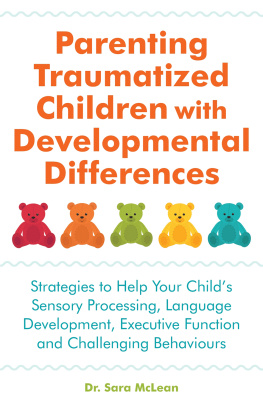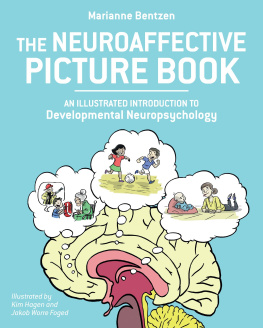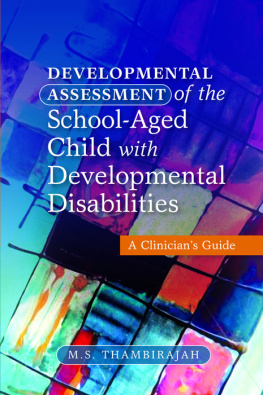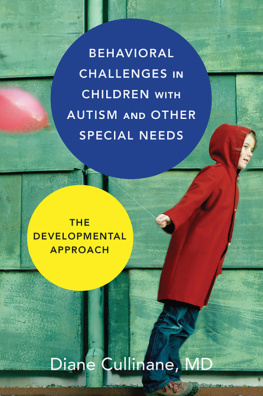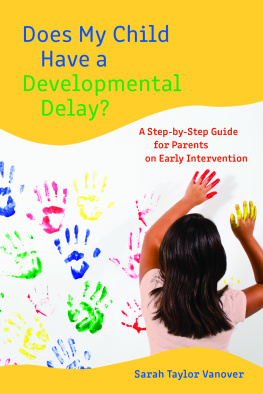
PARENTING TRAUMATIZED CHILDREN WITH DEVELOPMENTAL DIFFERENCES
Strategies to Help Your Childs Sensory Processing, Language Development, Executive Function and Challenging Behaviours
Dr Sara McLean

Jessica Kingsley Publishers
London and Philadelphia
Contents
Introduction
Why read this book?
If you are a foster carer or adoptive parent who is struggling to support a child with significant behavioural issues, then this book is relevant to you.
As any foster or adoptive parent knows, behavioural problems are common amongst foster and adopted children, and this book is written with both carers and childrens needs in mind.
Have you have noticed any of the following?
You find that the parenting approaches you have used before arent working.
Your child has difficulty following instructions.
Your child has difficulty in seeing things through.
Your child has difficulty in getting started on tasks.
Your child seems deliberately non-compliant.
Your child has trouble managing their behaviour.
Your child seems to explode without apparent reason.
You find yourself wondering why your child is more difficult to support than other children.
You are starting to doubt your own abilities as a foster or adoptive parent.
If any of the above are true for you, then it could be worth working through the chapters in this book. This book introduces the concept of developmental differences amongst children in out of home care and explains what a childs developmental differences might mean for their behaviour.
What are developmental differences?
Our understanding of the relationship between early childhood adversity and brain development is rapidly developing (see ). This emerging knowledge is helping us to better understand how the brain development of children who have experienced adversity differs from other children because of their very different developmental experiences.
This book introduces the concept of developmental difference as a hallmark characteristic of many children who come into foster or adoptive care. Developmental difference is a term that I have introduced to describe key characteristics of children who have experienced early adversity: developmental because these issues arise in the context of their early development; and difference because the term reflects patterns of vulnerability and difference when compared with other children. Children placed in foster or adoptive care are likely to experience one or more interrelated areas of developmental difference and these are the focus of this book.
In this book, I describe what these developmental differences mean for caregiving, discipline and behaviour, and I provide concrete tips on how to support children with any of these developmental differences.
The impact of early adversity on brain development is a rapidly developing area of research. This is not a book full of research information, although Ive included references for you to follow up if you are interested. The purpose of this book is to provide you with practical strategies to support children who are living with one or more areas of developmental difference.
My approach to supporting children focuses on the functional and trans-diagnostic difficulties that children experience. Trans-diagnostic difficulties refer to the kind of skills that children who have been given a range of diagnostic labels struggle with (e.g. ADHD, oppositional defiant disorder, conduct disorder.) This means that I encourage parents to look beyond the childs current diagnosis and instead to focus on strengthening the areas of developmental difference that are needed to support their child right now. As well see, children with a range of developmental differences need to be supported in similar ways.
First, we need to adjust our expectations for a child. We need to understand Whats different for this child? rather than Whats wrong with this child? Second, we need to modify the childs environment, making it easier for the child to experience success. Finally, we need to teach the child the skills and competencies that they may be missing. Well talk more about what all this means throughout this book.
In well look at the types of adversity that children can face. Well look at how these experiences contribute to areas of developmental difference. Ive also included some of the readily available literature on brain development and early adversity for those of you who are interested in reading further.
will provide a guide to the key developmental milestones at each developmental stage, and provide indicators of developmental delay for each developmental stage.
In well look at the main reasons that children can have challenging behaviour. Well identify the clues that behaviour is driven by developmental difference as opposed to other possible causes. This chapter will also outline some principles for approaching behavioural concerns in children.
we will introduce the first of the developmental differences sensory regulation difficulties (managing how our body reacts to the sensory world) and describe how to identify and support children with these sensory processing issues.
will introduce developmental differences in language and communication and describe how to identify and support children with language and communication difficulties.
In we will look at how to identify and support children with developmental difference in the capacity for emotional regulation (managing how our body reacts to strong emotions). Well look at strategies for building childrens emotional literacy.
will introduce the concept of executive functioning (the way the brain organizes thinking and memory) and memory difficulty (and what this developmental difference means for childrens flexible thinking, planning and organization skills). Well look at the strategies to support the development of executive functioning and memory skills in children with this developmental difference.
will introduce the emerging evidence on childrens social processing bias (the way we interpret social situations and information), and what this means for children with this developmental difference.
In well look at how to communicate information about your childs developmental differences to key professionals in your childs life (such as their caseworker and their teacher).
In , well re-visit and summarize the key principles for supporting your child.
Appendices 13 contain blank sensory sheets that you can copy and tailor to your child. They can be reprinted and updated when your strategies are adapted as your child grows older.
This book is designed to augment what you are probably doing already to support your child. The foundation of high quality caregiving is safe and nurturing parenting together with age-appropriate boundaries and consequences. The strategies in this book are not intended as a substitute for high quality parenting; high quality nurturing care is necessary but may not be sufficient to meet the needs of children with developmental difference.
This book provides a toolkit of options and ideas in the case where extra support might be needed and where traditional discipline has not been effective. I hope it provides you with strategies for supporting your child right now, with enough information to determine when further support might be needed and also with the information you need to advocate on your childs behalf.
Chapter 1
Early Adversity and
Developmental Difference
Well begin by exploring what we know about the impact of early life adversity on childrens development. There are two main areas of childrens development that are affected by adverse caregiving experiences.
Next page
